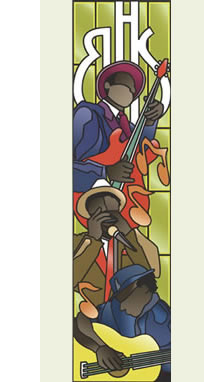
|
|
It's gonna be a hollerin', shakin' good time at Blue Heaven Studios for the 17th Blues Masters at the Crossroads. Where, in our converted church sanctuary, the gospel to some, the devil's music to others — the blues — has its due. This is your year to experience it all. Your seat is waiting!
|
|
Friday, October 17th and
Saturday, October 18th, 2014
Doors Open at 6:45 p.m.,
Shows Start at 7:15 p.m. |
Blue Heaven Studios
201 S. Eighth Street
Salina, Kansas 67401
785-825-8609 |
| |
| Lineup for Friday |
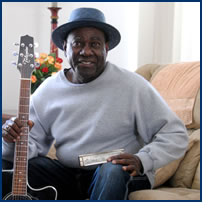 Rip Lee Pryor Rip Lee Pryor
Richard “Rip” Lee Pryor was born into music. In his youth he yearned to be just like his father, renowned blues musician Snooky Pryor. Snooky, long-time Blues Masters concert historians will recall, was the closing act for the very first Blues Masters Sept. 18 and 19, 1998. Needless to say, that family connection is special to us and we're excited to have Rip in this year's lineup.
Rip's childhood was wrapped in rhythmic blues; his adult life focused on career success.
“I was just infatuated with what my dad did,” Pryor says. “I just tried mimicking his records.”
The two recorded and toured together in the 1990s but when his father retired, Pryor set out to hone his own career. He retired from a job in carpentry, battled cancer, then returned full-time to the music scene in 2011. Since that time he's completed three tours of South America and one of Switzerland, as well as re-connected with the Southern Illinois music scene.
Picking up his dad's old harmonicas and playing along with records as an adolescent, Pryor could feel the rhythm flowing through his blood. The blues were built into his DNA.
After successfully battling into remission Multiple Myeloma, a form of bone marrow cancer, Pryor got serious about music. “I'm going to play music because that's where my heart was at, and that's what I wanted to do,” he says.
Southern Illinois (he resides in Carbondale) offers wineries and venues forming an eclectic mix for a blues artist. Wherever he goes, Pryor entertains audiences of all kinds. It's not hard to imagine that there's an audience of one looking down from above, a father proud of his son. And for the son it's an honor to keep the father's legacy alive. Appreciative audiences have given Pryor a second lease on life.
“You can tell when they genuinely enjoy what you're doing; that's the fuel that keeps me going.”
|
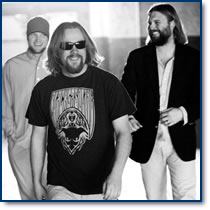 Moreland & Arbuckle Moreland & Arbuckle
They describe themselves as “Roots Rock from the Heartland” and boy, do they ever! In Kansas, where good blues is separated usually by great distance, anything within 100 miles has got to qualify as blues local. These guys are from Wichita. Singer and harp man Dustin Arbuckle said he attended early Blues Masters shows when he was just finding his voice, and he cites meeting Hubert Sumlin in the church basement as one of his biggest thrills.
Arbuckle first met guitarist Aaron Moreland at an open mic jam in Wichita in 2001. Since, they’ve been honing a relentless and haunting sound that merges Delta blues, folk, rock, traditional country and soul. The duo is actually most often booked as a three-piece, with new drummer Kendall Newby holding it down. Arbuckle takes the vocals and brings a throw-back-styled, rich-toned harmonica. Moreland plays all kinds of guitars, including a handcrafted cigar box model. Four strings are stretched across a cigar box, with one string feeding into a bass amp and the other three into a guitar amp. It’s a gritty, electrified descendent of the cigar box guitars that Delta bluesmen of the early 1900s often employed.
While Arbuckle, a Wichita native, was mostly influenced by Delta blues, country and bluegrass music, Moreland, from Emporia, grew up listening to everyone from Led Zeppelin and Black Sabbath to Charley Patton and Muddy Waters. And all of that makes the cut in this group’s style and sound.
Their 2013 album for Telarc, a division of the Concord Music Group, is 7 Cities. It tells the story of Spanish Explorer Coronado and his fabled search for the seven cities of gold in the group's Kansas prairie homeland. “Quivira” is the raw, garage blues opening track on the album. Arbuckle croons “I hollered out to Coronado/Come and meet me in The Dog/But he could not find his way/Through the morning fog.” And so begins the musical odyssey.
“It’s definitely our strongest work,” says guitarist Moreland, who with Arbuckle and Newby teamed with Seattle-based producer Matt Bayles (Mastodon, the Sword) and recorded in Stone Gossard’s studio. “We’ve always produced our own records, but this time, Matt took things to a new level sonically and brought out our best performances.”
The sounds of 7 Cities are vintage rock (“Kow Tow”) and twang (“The Devil and Me”) with a few barnburners (“Tall Boogie”, “Road Blind”), all of it rooted in the spirit of the Delta blues. “That strong pre-war blues sensibility is still there. We’re still that rare trio with guitar, harmonica and drums, but we've progressed as musicians; we’ve brought in our other influences, and formed a pretty unique sound.” For the album cover, Peter Manchester from New Brunswick, Canada was commissioned to paint a conquistador helmet on the Kansas prairie.)
|
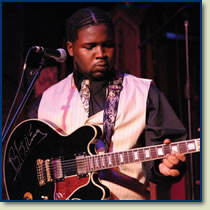 Marquise Knox Marquise Knox
“This excerpt from Here I Am's liner notes says it best. 'When you listen to Marquise — 19 years old when he recorded this title — you get the sense that this is what those masters must have sounded like as young men. Marquise’s blues are so transparent and bare. It’s so easy to feel his music as totally legitimate. That’s above all what makes it so appealing. That’s what makes Marquise Knox special. He’s the whole package. A throwback blues master on the rise. Anybody believe in reincarnation?'" — Marquiseknox.com
What's new in Marquise Knox's world since his sizzling set at the 2013 Blues Masters at the Crossroads? Plenty. The 23-year-old St. Louis blues prodigy has been rocking stages in his hometown and hitting the road hard, playing blues and folk festival dates in places like the Calgary International Blues Festival; Lowell, Mass.; Quincy Ill.; Clearwater, Fla., and many more.
A once-in-a-generation type of talent with the voice, the songwriting talent, the guitar chops and the showmanship more kin to peers twice his age, Marquise grew up listening to Lightnin' Hopkins, Muddy Waters, Johnny Lee Hooker, and B.B. and Albert King. He spent his early teenage years in St. Louis mentoring under the late great Blues legend, N.E.A. Heritage Fellowship recipient and Grammy Award winner Henry James Townsend.
He’s since opened for B.B. King, and performed with legends like Townsend, Louisiana Red, Robert Lockwood Jr., and Honeyboy Edwards! One of the most exciting young players to emerge in St. Louis, Marquise embodies the soul and essence of a veteran bluesman, with his command of guitar and harmonica combining with his energetic showmanship. He has also performed at dozens of festivals, and has toured Germany and played the Baden Blues Festival in Switzerland.
Born in 1991 in St. Louis Mo, Marquise hails from a musical family deeply entrenched in the Blues. He learned how to play guitar from his grandmother Lillie whose family were sharecroppers and whose great, great grandparents were slaves. He also played with his uncle Clifford, who was a major influence in Marquise's life.
Marquise met Sam Lay during a visit to Clarksdale, Mississippi. Like other statesmen of the Blues, Sam took an immediate liking to Marquise and took it upon himself to help give Marquise's career a boost by insisting that Chad Kassem bring Marquise to the celebrated blues series "Bluesmasters at the Crossroads", which has showcased a virtual who-who of the Blues at Blue Heaven Studios. Marquise was an immediate crowd favorite, and was adopted by all of the elders of the Blues in attendance that year. He's continued to return to Blues Masters in years since and has recorded three acclaimed albums at Blue Heaven Studios. His debut album Manchild was nominated for a Blues Music Award for Best New Artist Debut.
|
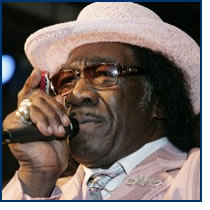 Big George Brock Big George Brock
"You don't hear blues today. You think you do, but you don't. I'm talking about the younger generation. You're hearing crossover. To me, blues is…I don't know. Big George Brock. That's about as close – not close – it is the blues." – Sonny Payne, the regular host of KFFA's King Biscuit Time radio show in Helena, Arkansas since 1951
Heavyweight Champion of the Missouri Blues Harp, Big George Brock is taking on all comers. "I am the only musician with a gold belt. Whenever I look at the belt on the mantel, I feel a sense of pride. I challenge any musician who thinks they're bad enough to remove it from my waist." Brock brings that same bravado to the stage.
Born in Grenada County, Mississippi in 1932, Brock did not come from a musical family. Of his two parents and 16 siblings, he was the only one who pursued music. His father bought him a harmonica when Brock was nine years old and by age 12, he was performing at Saturday night fish fries with friends Lee Kizart and Big Jack Johnson. Brock was also an accomplished boxer in his youth, not hard to envision when you see this enormous man with catcher-mitt hands. When Brock cups a harp it looks like King Kong trying not to hurt the girl.
Brock moved to St. Louis in 1953 and continued as a blues performer. He soon opened his Club Caravan, which booked acts like B.B. King, Howlin' Wolf, Muddy Waters, Jimmy Reed, Gatemouth Brown and Albert King. Brock performed with them all. While he had many opportunities to record – including with Chess Records – and to tour, he preferred staying in St. Louis and operating his club. Brock finally closed Club Caravan in 1970, under tragic circumstances. Brock had thrown out an unruly customer. The man returned with a gun and fired at Brock. The bullets missed and sprayed through the kitchen wall, hitting and killing Brock's wife. Brock, in his mourning, closed the club.
Brock didn't make his recording debut until he was in his 60s when he released a pair of self-produced 45s followed by an LP and a CD reissue. In 2005, Cat Head Records released Brock's Club Caravan, and in 2006, APO Records released Heavyweight Blues, recorded at Blue Heaven Studios.
|
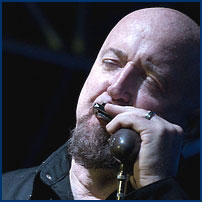 Kim Wilson Kim Wilson
The lead vocalist and frontman for The Fabulous Thunderbirds rose to national fame with the band in the mid-'80s on two massive signature hits: “Tuff Enuff", and "Wrap It Up." Playing with the Thunderbirds' original lead guitarist, Jimmie Vaughan (and joined on stage more than once by Jimmie's famed younger brother Stevie Ray Vaughan), Wilson's singing and harmonica playing are his hallmarks. The Thunderbirds' blues style mixed Texas blues with the harmonica laced swamp blues sounds of Slim Harpo and Lazy Lester — both of whom the Thunderbirds covered.
This August saw the release of For Pops (A Tribute to Muddy Waters) by Kim and Mud Morganfield (a Blues Masters 2012 alum), son of the legendary bluesman, saluting the classic blues music of Mud's father in the 100th anniversary year of Muddy's birth.
The genesis for the project was simple, says Severn Records president David Earl — fans demanded it. And both Mud and Kim enthusiastically agreed. The album, with the feel of a late-night jam session, tackles some of Muddy's better known tunes and lesser ones. Wilson lives up to his reputation as the finest purveyor of the "Little Walter" harmonica style by laying down some of his best work to date. Backing them is the crack team of Billy Flynn and Rusty Zinn (guitars), Barrelhouse Chuck (Piano), Steve Gomes (bass) and Robb Stupka (drums).
The Thunderbirds in 2013 released a new album, On The Verge. Says Kim: “I think it’s a very diverse record. I think there’s a lot of bluesy stuff, but there is a lot of soul-y kind of R&B. It’s really more Americana. I’m not really a dyed-in-the-wool soul singer, but people seem to think I am on this one. I am just singing along with the tracks and doing it in my own way. “
Born in Detroit in 1951, Wilson grew up in California and fell under the sway of the blues in the late 1960s, honing his chops under the tutelage of people like George “Harmonica” Smith, Luther Tucker and Pee Wee Crayton. He formed the Thunderbirds with guitarist Jimmie Vaughan in Austin, Texas, in 1974. Wilson remains in high demand as a contributor to the music of others — you'll hear him on albums of artists such as Bonnie Raitt, Paul Simon, Carlos Santana and many others. He also tours extensively, playing prestigious music festivals worldwide, and showing up in the kinds of funky clubs in which his talents were originally forged.
|
| Lineup for Saturday |
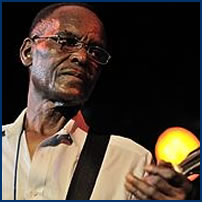 Joe Beard Joe Beard
Born and raised in Ashland, Mississippi, guitarist Joe Beard was surrounded by aspiring and veteran blues musicians. Matt "Guitar" Murphy and his brother Floyd were Beard's childhood buddies and the ones who initially got him started on guitar.
Beard moved to Rochester, New York in the mid-1950s and from time to time would visit one of his brothers in Chicago. He became enamored with the blues being played there and eventually sat in both with John Lee Hooker and Muddy Waters.
In Rochester, he formed the Soul Brothers Six, playing bass and singing. He wouldn't perform in public on guitar until 1965. For most of the '60s on through the '80s, Beard worked as an electrician by day and would occasionally play out at night and on weekends. He long ago gained a reputation as one of the best local players around Rochester and has sporadically been counted as one of the best nationally.
In the '90s, Beard began recording with the Audioquest label, and those two releases have won major acclaim within the blues and audiophile communities.
|
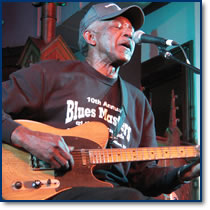 Lazy Lester Lazy Lester
Leslie Johnson was born June 20, 1933 in the small town of Torras, Louisiana, and was raised mostly in Scotlandville, a suburb of Baton Rouge. As a boy, he worked at a grocery store, where he purchased a harmonica and Little Walter's famous "Juke" record. Lester began to blow harp and later learned to strum his brother's guitar.
It was in the mid-1950s that fate turned Lester's way. He was living in Rayne, Louisiana, at the time and was on the bus riding home. Lightnin' Slim, who was already an established recording artist, was also on the bus and was headed to Crowley to cut a record at Jay Miller's Studio, where so much of the material for the Nashville-based Excello Records was being recorded. Lester stayed on the bus and accompanied Slim to the studio. When they got there, the scheduled harp player didn't show for the session. Lester told Slim that he thought he could handle the harp parts for the session. Remarkably, Slim and Miller gave Lester that chance, and he did not disappoint. A classic pairing was born, and Lester became a mainstay on Slim's Excello recordings and gigs.
Miller was impressed by Lester's work, and in 1957 Lester debuted as a lead artist on Excello. Before Lester's first record release, Miller had decided that "Lazy Lester" had more of a ring to it than "Lester Johnson." Lester's first legitimate hits came in 1958 with the release of "I'm A Lover Not A Fighter" backed with "Sugar Coated Love." Those two songs established Lester as a star. He hit again with the follow-up record, "I Hear You Knockin'"/"Through The Goodness of My Heart." Lester remained a regular Excello artist, making 15 records for the company.
In 1975, Lester moved to Pontiac, Michigan. He retired from music until the late '80s when he recorded Lazy Lester Rides Again for the Blue Horizon label, winning a W.C. Handy Award. That led to a deal with Alligator Records. Since, he's recorded twice for Antone's and cut one direct-to-disc for APO Records, recorded here at Blue Heaven Studios.
Lester's was honored with an induction in 2012 into the Blues Hall of Fame by the Blues Foundation. The Blues Hall of Fame committee consists of scholars, record producers, radio programmers, and historians.
|
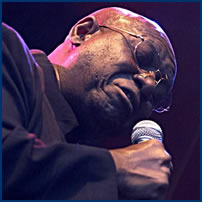 Mighty Sam McClain Mighty Sam McClain
American soul blues master Mighty Sam McClain was born in Monroe, Louisiana, where at 5 years old, he began singing in his mother's gospel church. McClain left home when he was 13 and followed local R&B guitarist, Little Melvin Underwood through the Chitlin' circuit, first as his valet and then as lead vocalist himself at 15.
Throughout McClain’s more than 50-year career, he has seen everything from being homeless to nominated for a Grammy Award. Still going strong at age 71, McClain's 2012 impressive album Too Much Jesus (not Enough Whiskey) garnered a nomination for Soul Blues Album of the Year from the Blues Foundation for the Blues Music Awards ( formerly W.C. Handy Awards), Song of the Year for the title track and a nomination for Mighty Sam as Soul Blues Male Artist of the Year.
McClain has never been content to rest upon his considerable reputation as a soul-blues belter. He's always expanding his musical visions and even cut a world music album with Iranian singer Mahsa Vahdat, 2010's Scent of Reunion: Love Duets Across Civilizations. Their 2012 follow-up was A Deeper Tone of Longing. On Too Much Jesus Mighty Sam drops a whole lot of funk and gospel into the mix for an album that motivates your feet even as it lifts your spirit. McClain wrote all the tunes with longtime guitarist Pat Herlehy, and his soulful playing throughout is a perfect complement to McClain's warm, congenial vocals, writes AllMusic.com
They slip into a seductive Philly soul groove on two outstanding tracks: “Tears,” with an arrangement that brings to mind the work of Thom Bell with its simmering midtempo groove, and “So Into Me,” a fervent love song with a simple heartfelt lyric that McClain delivers with a down to earth passion. The title tune is McClain's prayer of thanksgiving for a life of sobriety and it's based on the complaint of his old friends who told him that his home had too much Jesus and not enough alcohol in evidence. It's a gentle soul ballad that McClain delivers with a winning mix of irony and righteousness.
Too Much Jesus (not Enough Whiskey) is about what happens when someone decides to 'clean up' and change life's priorities. Sam's dynamic vocals backed by a groovin' rhythm section, featuring the Mighty Horns, all part of his signature sound. The music is for all ages and appetites with soul, funk, blues, jazz and gospel all mixed together in the unique way only Mighty Sam McClain can deliver.
|
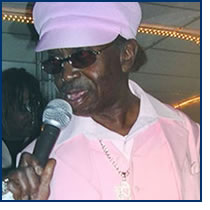 Sonny Green Sonny Green
For Southern Soul Blues performed with grit, wit and sartorial splendor, there is only one man to go to: Los Angeles-by-way-of-Louisiana singer Sonny Green. Coming from the same emotional and musical place as his bar room philosophizing contemporaries Johnny Taylor, Bobby Patterson and Little Milton, Green's "Jody's On The Run" is considered a classic in the endless canon of back room cheating songs.
Of his 1960s recordings, the bluesy ballad “It’s A Game” is probably the best, with a fine tortured Green vocal. Higher production values in the later decade paid immediate dividends as his excellent double sided debut for Matt Hill showed. “If You Want Me To Keep On Loving You” was another hit, a blue soul item, very much in the “Don’t Make Me Pay” mold – super electric piano and guitar, plus a fine horn section and a committed vocal performance. The flip “Jody’s On The Run” was a real funky screamer of an answer to Johnnie Taylor’s smash.
Truth told, Sonny is at ease being “the man.” His singing style comes from the vocabulary of Bobby Bland and inhabits the gravel end of Bland’s voice. He sings slow, easy soul songs that tell a story, he is an interpreter of the hits of his contemporaries: Johnnie Taylor, Bobby Womack, his late friend ZZ Hill and, of course, the late master Bobby Bland.
|
 Kim Wilson with Billy Flynn (Acoustic) Kim Wilson with Billy Flynn (Acoustic)
The lead vocalist and frontman for The Fabulous Thunderbirds rose to national fame with the band in the mid-'80s on two massive signature hits: “Tuff Enuff", and "Wrap It Up." Playing with the Thunderbirds' original lead guitarist, Jimmie Vaughan (and joined on stage more than once by Jimmie's famed younger brother Stevie Ray Vaughan), Wilson's singing and harmonica playing are his hallmarks. The Thunderbirds' blues style mixed Texas blues with the harmonica laced swamp blues sounds of Slim Harpo and Lazy Lester — both of whom the Thunderbirds covered.
This August saw the release of For Pops (A Tribute to Muddy Waters) by Kim and Mud Morganfield (a Blues Masters 2012 alum), son of the legendary bluesman, saluting the classic blues music of Mud's father in the 100th anniversary year of Muddy's birth.
The genesis for the project was simple, says Severn Records president David Earl — fans demanded it. And both Mud and Kim enthusiastically agreed. The album, with the feel of a late-night jam session, tackles some of Muddy's better known tunes and lesser ones. Wilson lives up to his reputation as the finest purveyor of the "Little Walter" harmonica style by laying down some of his best work to date. Backing them is the crack team of Billy Flynn and Rusty Zinn (guitars), Barrelhouse Chuck (Piano), Steve Gomes (bass) and Robb Stupka (drums).
The Thunderbirds in 2013 released a new album, On The Verge. Says Kim: “I think it’s a very diverse record. I think there’s a lot of bluesy stuff, but there is a lot of soul-y kind of R&B. It’s really more Americana. I’m not really a dyed-in-the-wool soul singer, but people seem to think I am on this one. I am just singing along with the tracks and doing it in my own way. “
Born in Detroit in 1951, Wilson grew up in California and fell under the sway of the blues in the late 1960s, honing his chops under the tutelage of people like George “Harmonica” Smith, Luther Tucker and Pee Wee Crayton. He formed the Thunderbirds with guitarist Jimmie Vaughan in Austin, Texas, in 1974. Wilson remains in high demand as a contributor to the music of others — you'll hear him on albums of artists such as Bonnie Raitt, Paul Simon, Carlos Santana and many others. He also tours extensively, playing prestigious music festivals worldwide, and showing up in the kinds of funky clubs in which his talents were originally forged.
|
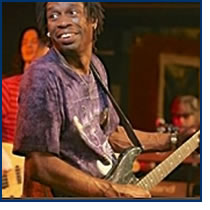 Bernard Allison Bernard Allison
Bernard Allison totes the same smokin’ six string shooter that his late father Luther Allison assaulted the blues with. And he is blessed with his father’s soulful voice, spiritual devotion, and a musical freedom which experiments with the blues. Born in Chicago on November 26th, 1965, the youngest of nine children, Bernard was first introduced to the roots of black music and the art of the electric guitar by his father, the late great Luther Allison. Like Ken Griffey Jr. hanging out in baseball locker rooms as a youth, Luther’s son was the kid running on-stage throughout the band’s set. Experiences like that profoundly effect one’s aspirations. “That’s when I decided I wanted to be up there like him. I think I was seven.”
“I didn’t start to play ‘til I was maybe 10 years of age” Bernard recalled “I picked up the guitar and listened to his records.” While Luther was absent, his record collection played a major role in shaping the son’s direction. Bernard listened to his dad’s influences like Magic Sam, Otis Rush, T-Bone Walker, Lightnin’ Hopkins, and B.B. King. He also got into the next generation that followed, people like Stevie Ray Vaughan, Johnny Winter, and Jimi Hendrix.
Bernard made his first appearance on record at age 13, when he played on a live LP his father recorded in Peoria, IL. “When we moved to Peoria, Dad came home preparing to do his live album in Peoria, I hooked up the amplifier and guitar in the basement and started playing his first record, Love Me Mama, note for note. He freaked out and said tonight you’re gonna record with me. That was my first recording. I played “You Don’t Love Me Know More” and “Sweet Home Chicago.”
Luther brought Bernard his first guitar, a Fender Stratocaster, and told him to first get an education. At 18, Bernard joined his father on-stage at the 1983 Chicago Blues Festival. Then, one week he graduated from high school, Bernard got a call from Koko Taylor asking to be her lead guitar player.
He joined Koko Taylor’s Blues Machine for three years. “Koko and Pops Taylor taught mew the do’s and don’ts of the road. Being really careful and watching people. They were like my mom and pops. It was a great education, I was able to tour the world and see different cultures. We backed Willie Dixon; Koko was the only group I played in besides my father.”
The 1980s became Bernard's classroom — relationships with Johnny Winter and Stevie Ray Vaughan expanded Bernard's guitar foundation. Bernard released his first solo album in 1980 with the significant title The Next Generation. He followed that in 1993 with Hang On, then Funkifino, No Mercy. Bernard’s other titles during the 1990’s included Born with the Blues, Keepin' the Blues Alive, and Times Are Changing. In the new millennium, Bernard’s recordings include Across the Water, Storms of Life, Kentucky Fried Blues, the highly personal Higher Power, and Energized, a live recording and DVD from a 2005 show.
It’s obvious that Bernard has inherited Luther's knack for igniting audiences; but he's no clone of his famous father. He is definitely blazing his own path with a style that reflects a unique mix of traditional and modern influences. The Allison torch has been passed, and it's clear that Bernard takes his role as its bearer very seriously. He's assumed the challenge of keeping the blues alive and growing - a commitment he renews every time he takes the stage.
|
|
| |
|


